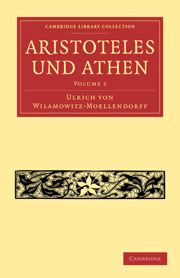Book contents
- Frontmatter
- Contents
- ZWEITES BUCH. Untersuchungen auf grund der aristotelischen Politie
- 1 Die quellen der griechischen geschichte
- 2 Die athenische politie von Kekrops bis Solon
- 3 Die athenische politie von Peisistratos bis Ephialtes
- 4 Πάτϱιoς πολιτεία
- 5 Die könige von Athen
- 6 Trittyen und Demen
- 7 Der athenische name
- 8 Der Areopag vor Ephialtes
- 9 3000 hopliten von Acharnai
- 10 Diobelie
- 11 Tιμήματα παρεχόμενοι
- 12 Λόγος und εὔϑυνα
- 13 Προχειροτovία
- DRITTES BUCH. Beilagen
- Sachregister
1 - Die quellen der griechischen geschichte
Published online by Cambridge University Press: 10 November 2010
- Frontmatter
- Contents
- ZWEITES BUCH. Untersuchungen auf grund der aristotelischen Politie
- 1 Die quellen der griechischen geschichte
- 2 Die athenische politie von Kekrops bis Solon
- 3 Die athenische politie von Peisistratos bis Ephialtes
- 4 Πάτϱιoς πολιτεία
- 5 Die könige von Athen
- 6 Trittyen und Demen
- 7 Der athenische name
- 8 Der Areopag vor Ephialtes
- 9 3000 hopliten von Acharnai
- 10 Diobelie
- 11 Tιμήματα παρεχόμενοι
- 12 Λόγος und εὔϑυνα
- 13 Προχειροτovία
- DRITTES BUCH. Beilagen
- Sachregister
Summary
Die quellenkunde der griechischen geschichte ist eine disciplin, die etwa vor einem menschenalter erfunden ist und am bequemsten in dem verbreiteten abrisse von A. Schaefer studirt wird. da stehn mehr oder weniger kümmerliche biographische und litterarische notizen tiber die griechischen historiker bis ans ende des zweiten jahrhunderts v. Chr., also Diodor und Plutarch fehlen, um dafür in der römischen quellenkunde zu figuriren. wenn sie für die eine quellen sind, wieso sind sie's für die andere nicht? das buch trägt überhaupt sehr viel von der schuld, dass die studenten meinen, man lernte die griechische geschichte wesentlich aus den historikern.
Gleichzeitig ist mit einem sehr starken aufwande von arbeit, zumeist allerdings anfängerarbeit, der versuch gemacht, die späteren berichte aut ihre quellen zurückzufuhren. dabei ist einiges wertvolle ermittelt; es hat sich aber nachgerade herausgestellt, dass dieses quellensuchen ein recht schwieriges geschäft der litterarischen analysis ist. die historische analyse hat zwar fur die zeit nach Polybios viele und gute ausbeute ge- Iiefert; vorher verschwindend wenig. als das wichtigste methodisch wie praktisch gleich bedeutsame ergebnis darf man verzeichnen, dass die bedeutung der antiken sammler und forscher immer klarer hervortritt. leute wie Timaios Tstros Hermippos Apollodoros Alexandros von Milet sind ungleich kenntlicher geworden als Ephoros Theopompos Aristobulos. ihre reste aber finden sich vornehmlich bei grammatikern und philosophen, in scholien und lexicis, also in schriften, die unter den geschichtsquellen nicht zu paradiren pflegen.
- Type
- Chapter
- Information
- Aristoteles und Athen , pp. 3 - 33Publisher: Cambridge University PressPrint publication year: 2010First published in: 1893



